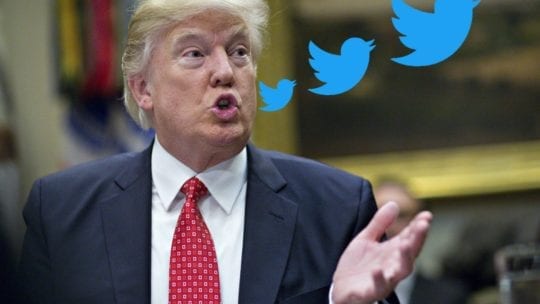
Here at PRNEWS, we're keen on producing live events for communicators, social marketers and more, so we're constantly monitoring the live event landscape. It was a big surprise to learn that The White House plans to host its first ever social media conference this Thursday. It came as less of a surprise, however, to learn that no representatives from Facebook or Twitter have been invited.
That's because anonymous sources from the scorned social networks "believe the summit would amount to a right-wing grievance session and was not aimed at seriously discussing some of the issues facing large technology companies," reports CNN.
Those grievances have been vocalized since last summer, when the Trump administration capitalized on a report released by Facebook employees claiming that the social network had a political bias in the content it prioritized. The administration seems certain that it is getting a bad shake from Silicon Valley. And it's largely set its sights on Google.
PR pros need pay no attention to such distractions, however. Instead, let's look at what's really going on with this "social media summit."
Don't forget that there are real national issues with big tech companies.
The White House seems to be avoiding the opportunity for a dialogue with Facebook, which has come under fire over the last few years for everything from its privacy practices (and insincere attempts at privacy reform) and problems with content moderation to gender bias on its ad platform and its longstanding fake news epidemic. It's no wonder that antitrust discussions are underway.
Contrasted from actionable proposals for social media regulation, like democratic Senator Mark Warner's thorough report from last summer, it is unlikely that the summit could move the needle without two of the largest platforms included in the discussion.
No transparency and false advertising
With this summit, Trump's brand has another event to fire up his base. But little information about the actual event is available.
This summit, purportedly about social media transparency, has not been communicated with any transparency itself around what will be discussed or who is even attending. And two of the largest tech companies, Facebook and Twitter, have confirmed they were never invited in the first place. It's a reminder that many in positions of power still believe that Americans will consider the mere gestural facade of an event to be a sufficient effort.
It's too early to tell whether opinions about this summit will fall along party lines, and whether it will address real issues. One thing to remember: false advertising shows that a brand thinks very little of its customers, as it assumes that they won't be able to smell what's really going on.
What a real dialogue about ranking bias would look like
Let's give the White House the benefit of the doubt for a second and assume that it has only extended invites to the companies with which it plans to have a substantive dialogue. Let's also assume that Google was one of the big tech companies to get the invite.
An important foundational aspect for the conversation would be the White House's knowledge of SEO. Officials need to understand the myriad ranking factors that influence how high a piece of content ranks in organic search. They need to know understand that a relevance score cannot be artificially engineered by keyword stuffing and backlinks.
It's also essential that they understand that the editorial integrity of a piece of content is a crucial factor when Google's algorithms consider its ranking—factoring in everything from metadata and tags to subheadings and readability. All told, if the editorial quality of a piece of content seems to be more questionable when coming from one political ideology over another, that is a separate issue.
If the summit discussion focuses on SEO, Google would likely be willing to go line for line through its ranking factors and tease out any changes borne out of recent core updates. Google could also explain what a core SEO update is, and how all digital teams constantly rejigger their strategies with every update to ensure their site is optimized with what Google's search crawlers are currently ranking for.
This is all just hypothetical, of course. We won't really know what transpires at Thursday's summit unless it is broadcast, recorded, transcribed or otherwise shared with the public—in all transparency. Unless that happens, communicators can only continue to soldier on with SEO and paid social, investing our time and resources in these tools until a big change suggests it's smarter to do otherwise.
